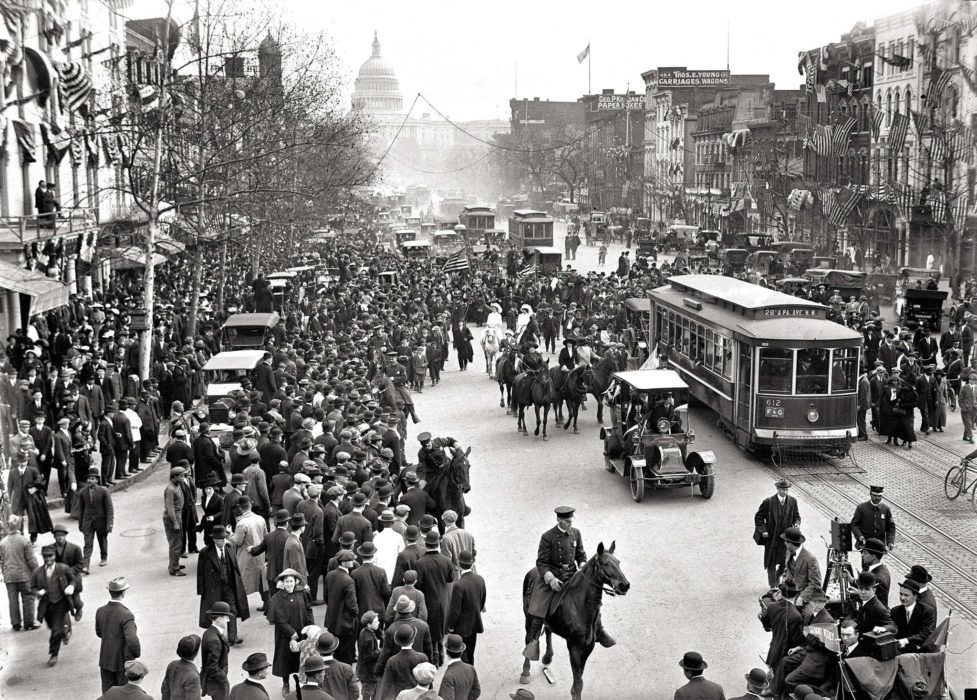AGNES PARSONS GOT DRESSED while it was still dark outside on Wednesday, November 6, 1912, the morning after the election. She had heard that ‘Abdu’l-Bahá’s train would be pulling into Washington’s Union Station at 6:30 a.m., so she rose early to arrive at the station on time. But the train didn’t come. When she learned that it would be at least an hour and forty-five minutes late, Mrs. Parsons had a long breakfast at the station.
The mercury was rising quickly when ‘Abdu’l-Bahá finally stepped down from the train just before 9 a.m. He got into Agnes Parsons’ carriage and was ferried to the house he had rented at 1901 Eighteenth Street, NW, just a five-minute walk from the Parsons’ home, near Dupont Circle. Every day for the next five days he would speak to large crowds in the Parsons’ bright white and yellow ballroom at 4 p.m. — it sat 150 people — and would welcome guests to his own residence every morning.
At 8:15 p.m. that night, ‘Abdu’l-Bahá rose to speak at the Universalist Church of Our Father, at Thirteenth and L Streets. Back on April 21 the church’s pastor, the Reverend Dr. John van Schaick, had waited on the sidewalk to meet ‘Abdu’l-Bahá, and had conducted him through a side door to the chancel. After an introduction, ‘Abdu’l-Bahá spoke on the underlying unity of the world’s religions. This time, he spoke about liberty.
“Praise be God! The standard of liberty is held aloft in this land,” ‘Abdu’l-Bahá began. “You enjoy political liberty; you enjoy liberty of thought and speech, religious liberty, racial and personal liberty. Surely this is worthy of appreciation and thanksgiving.”

Although ‘Abdu’l-Bahá prized America’s liberty, his long years of imprisonment had given him a fundamentally different understanding of freedom. “After being forty years a prisoner I can tell you that freedom is not a matter of place,” he told reporters on the SS Cedric in New York Harbor, on his first day on America. “When one is released from the prison of self, that is indeed a release.”
At the Universalist Church, ‘Abdu’l-Bahá connected liberty with being liberal toward others. “Liberalism is essential in this day,” he said, defining it as “justness and equity toward all nations and people.” Speaking of the openness and acceptance one must extend to all nations, races and creeds, he told the congregation: “Human attitudes must not be limited; for God is unlimited, and whosoever is the servant of the threshold of God must, likewise, be free from limitations.”
‘Abdu’l-Bahá then spoke about brotherhood and fraternity. He enumerated various types of brotherhood — those based on familial bonds, patriotism, race, even a sense of altruism towards the entire human race — noting that each, ultimately, was limited. Only a brotherhood based on the power of the Holy Spirit, he said — one that is truly “spiritual in character” — ensures that “indestructible brotherhood which includes all the divine possibilities and significance in humanity.”
‘Abdu’l-Bahá concluded his talk that evening by restating the unique role America must play in achieving international peace. “This noble nation,” he said, “intelligent, thoughtful, reflective, is not impelled by motives of territorial aggrandizement and lust for dominion.” He told his audience that Americans displayed a “oneness of interest and unity of national policy.”
“These are, indeed, United States,” he said. “Therefore, this nation possesses the capacity and capability for holding aloft the banner of international peace. May this noble people be the cause of unifying humanity.”






